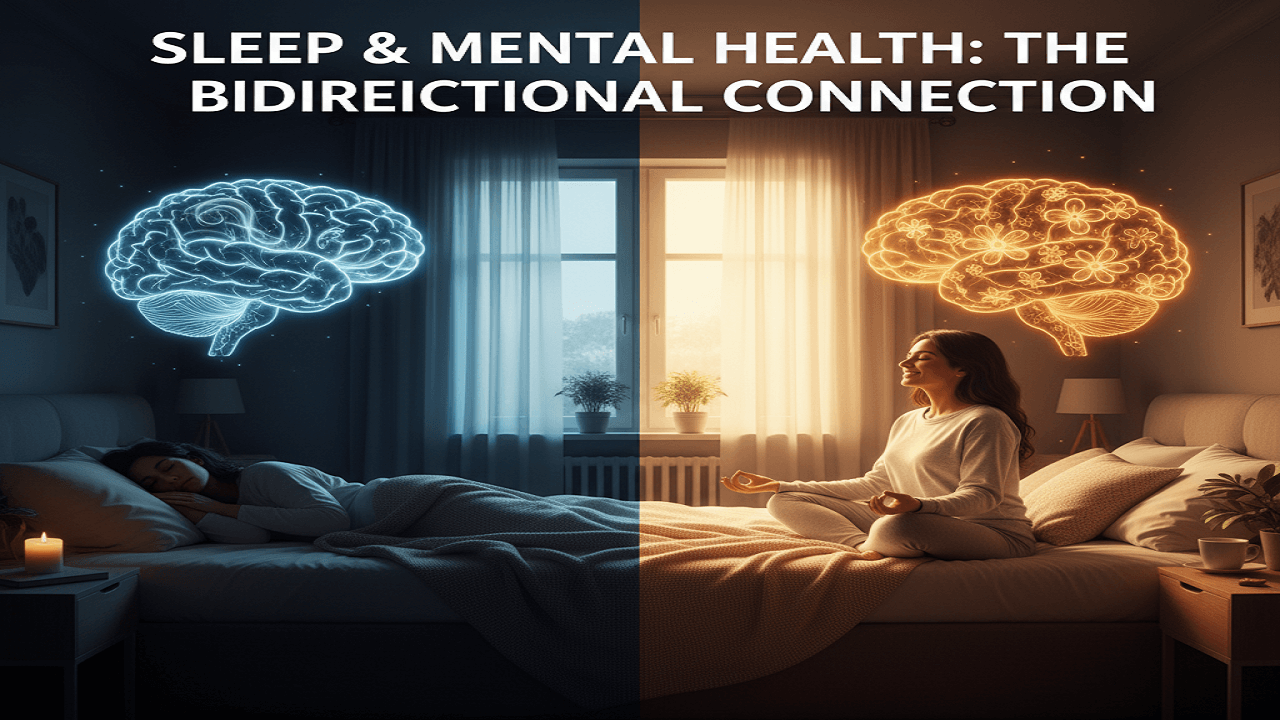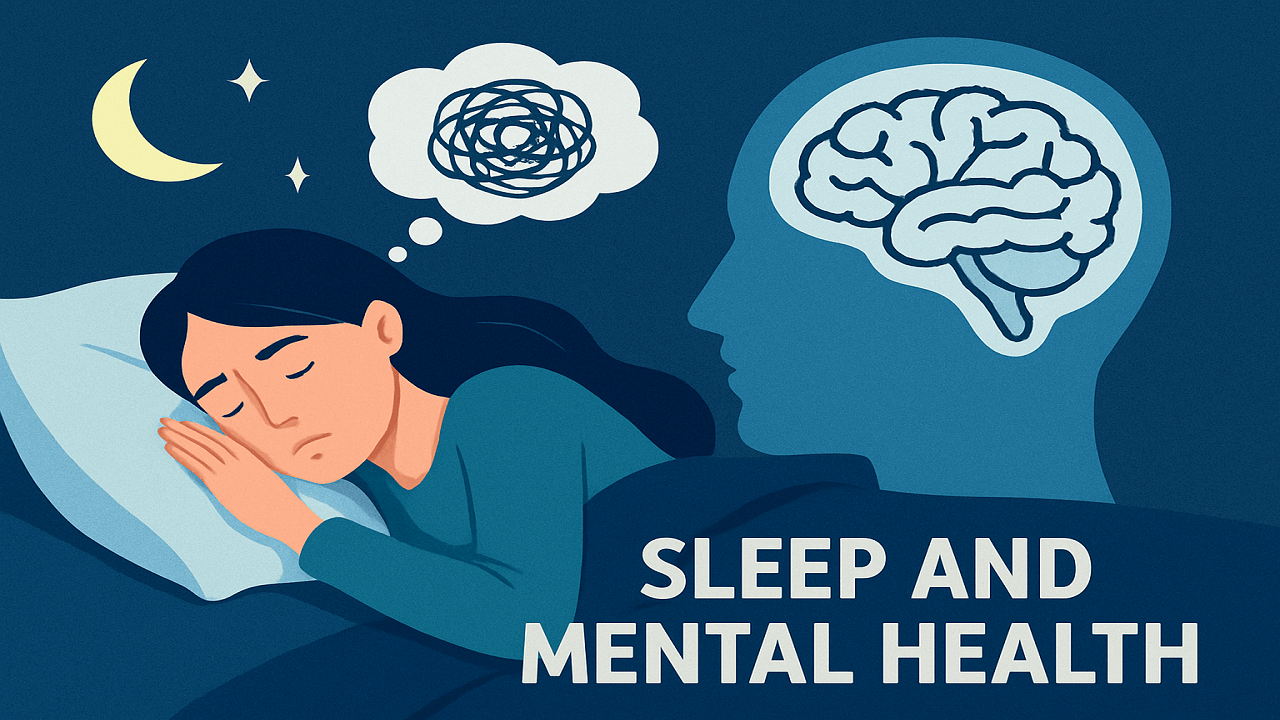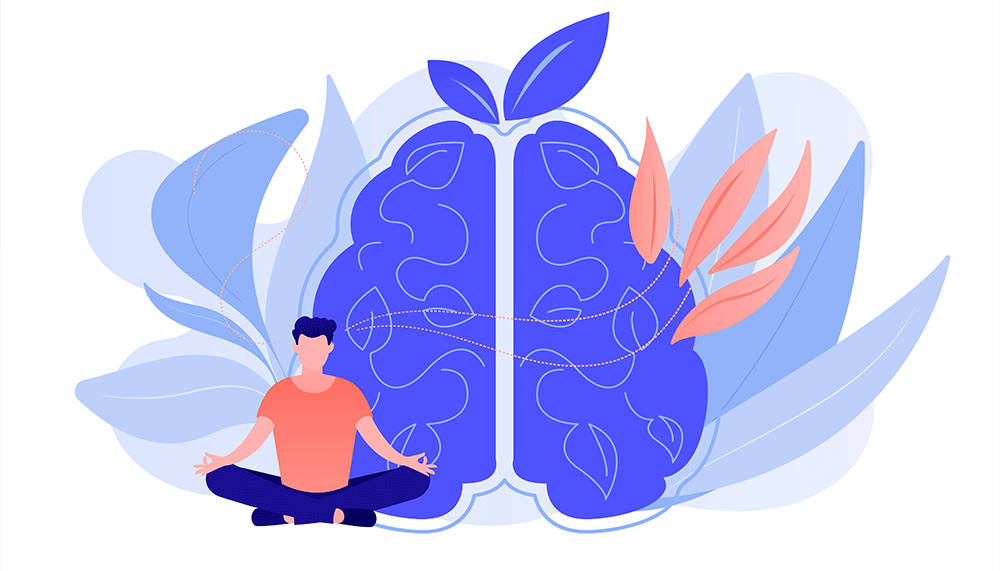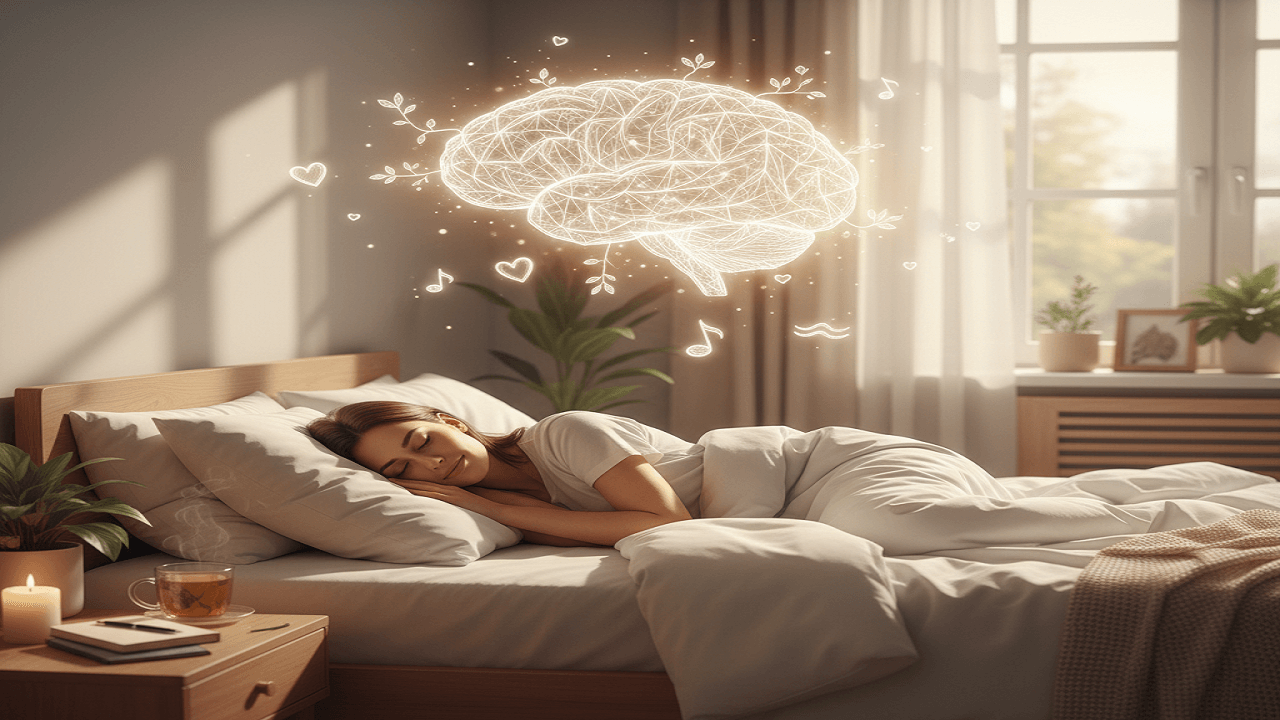Have you ever noticed how a restless night can leave you feeling emotionally fragile or irritable the next day? The connection between sleep and mental health is undeniable. When we sleep poorly, our mood, concentration, and ability to manage stress all take a hit. Likewise, when our mental well-being suffers—due to anxiety, depression, or emotional overload—our sleep tends to become disrupted, creating a cycle that’s difficult to break.
Quality sleep is more than a nightly routine; it’s a biological necessity for emotional stability and brain performance. During sleep, the brain restores energy, repairs tissues, and processes emotions from the day. Without adequate rest, our emotional responses become exaggerated, our stress hormones spike, and our mental resilience weakens. Studies show that chronic sleep deprivation can increase the risk of mood disorders by up to 60%, highlighting how essential rest is to psychological balance.
In today’s fast-paced, digitally connected world, millions of people struggle to get the seven to nine hours of restorative sleep that the brain requires. Late-night scrolling, caffeine consumption, and ongoing stress exacerbate the difficulty in maintaining healthy sleep patterns. Yet, understanding the relationship between sleep and mental health is the first step toward reclaiming your peace of mind—and improving both your rest and resilience.
Table of contents
2. How Sleep Affects Mental Health
The relationship between sleep and mental health goes far beyond feeling tired after a long night. Sleep plays a crucial biological role in supporting emotional balance, cognitive performance, and overall psychological well-being. When we sleep, the brain doesn’t simply shut off—it enters a highly active state of repair and reorganization.
During deep sleep and REM cycles, the brain processes emotions, consolidates memories, and clears out waste products accumulated during the day. These processes are vital for mental clarity and mood stability. When sleep is disrupted or cut short, emotional regulation suffers. You may notice you’re more reactive to stress, more irritable, or more prone to negative thinking after a poor night’s rest.
Research has repeatedly shown that insufficient sleep affects the brain’s limbic system—the region responsible for emotional control. This disruption can make people more vulnerable to depression and anxiety. Chronic sleep deprivation also alters neurotransmitters like serotonin and dopamine, which play a central role in mood regulation and motivation. Over time, the lack of restorative sleep can intensify existing psychological conditions or even trigger new ones.
Additionally, quality sleep strengthens the prefrontal cortex, the part of the brain that governs decision-making, self-control, and problem-solving. Without sufficient rest, it becomes increasingly difficult to concentrate, think clearly, or manage complex emotions. This explains why people who consistently get poor sleep often report higher levels of stress, irritability, and emotional exhaustion.
In essence, sleep acts as a natural emotional regulator. By allowing the mind to recover, rebalance, and reset, it protects against the buildup of mental fatigue and emotional instability. When your sleep suffers, your mental health almost always follows.
3. The Link Between Mental Health and Sleep Disorders
The relationship between sleep and mental health is a two-way street. Poor sleep can lead to emotional instability and cognitive decline, while mental health disorders often make it difficult to achieve quality rest. This cycle can quickly become self-perpetuating—stress disrupts sleep, and lack of sleep intensifies stress.
Scientific studies have found that between 50% and 80% of people with mental health conditions experience chronic sleep issues. In contrast, only about 15% of the general population reports the same problem. This striking statistic highlights how closely connected our mental and emotional well-being is to the quality of our sleep.
When sleep becomes fragmented or inconsistent, the brain’s emotional centers—especially the amygdala—become hyperactive. This overactivity makes individuals more sensitive to emotional triggers, leading to irritability, worry, and negative thought loops. Over time, sleep disturbances can contribute to more severe mental health conditions such as anxiety disorders, depression, and post-traumatic stress disorder (PTSD).
Likewise, conditions like depression, bipolar disorder, and obsessive-compulsive disorder (OCD) often cause significant disruptions in sleep patterns. For example, someone suffering from depression might experience insomnia, while a person with bipolar disorder might sleep excessively during depressive episodes and struggle with sleeplessness during manic phases. These opposing sleep disturbances make it difficult to maintain a balanced emotional rhythm.
It’s important to remember that addressing one side of this equation can often improve the other. Treating insomnia through behavioural therapy or improving emotional health through mindfulness and stress management usually leads to better sleep quality. Recognizing and addressing this reciprocal relationship is the first step toward breaking the vicious cycle between poor sleep and mental distress.
4. Sleep and Common Mental Health Conditions
Every mental health condition interacts with sleep differently, yet all share one truth: when rest suffers, symptoms often worsen. Understanding how sleep and mental health intertwine within specific disorders can help you recognize patterns and find more effective treatments.
4.1 Sleep and Depression
Depression and sleep problems often go hand in hand. People living with depression frequently experience insomnia or, conversely, sleep too much. Lack of deep, restorative rest affects serotonin levels and emotional stability, making depressive symptoms stronger. Studies show that poor sleep increases the likelihood of developing depression by nearly twofold.
Fortunately, improving sleep quality—through consistent schedules, therapy, and relaxation practices—can significantly reduce depressive episodes. While sleep alone cannot cure depression, it is a vital part of recovery and ongoing management.
4.2 Sleep and Anxiety
Anxiety disrupts the ability to fall and stay asleep. Racing thoughts, hyperarousal, and overthinking activate the body’s stress response, making relaxation almost impossible. The result is a vicious cycle: sleeplessness increases anxiety, which in turn makes sleep harder to achieve.
Simple habits such as reducing caffeine, turning off screens before bed, and practising deep breathing can restore balance. Cognitive behavioral therapy (CBT) for insomnia is also highly effective in addressing anxiety-related sleep disturbances.
4.3 Sleep and Grief
Grief—whether from loss, separation, or life change—can profoundly affect both emotional well-being and sleep. The mind’s natural healing process is interrupted by sadness, guilt, or distress, leading to restless nights. The more profound the grief, the more severe the sleep disruption tends to be.
Establishing bedtime routines, journaling before bed, or speaking with a therapist can provide emotional relief and improve rest during difficult times.
4.4 Sleep and Loneliness
Loneliness increases stress hormones like cortisol, which elevate alertness and make it harder to fall asleep. Over time, this constant emotional strain can weaken the immune system and worsen fatigue. Because humans are social beings, social isolation often disrupts the natural rhythm that supports healthy rest.
Reconnecting with friends, joining support groups, or simply sharing time with loved ones can lower stress and improve both sleep and mood.
4.5 Sleep and Seasonal Affective Disorder (SAD)
Seasonal Affective Disorder (SAD) occurs when reduced sunlight during the winter months disrupts the body’s circadian rhythm. This imbalance leads to low energy, depressed mood, and irregular sleep patterns. People with SAD often find it difficult to wake up or fall asleep at consistent times.
Light therapy, outdoor activity during daylight hours, and consistent sleep schedules can restore the body’s internal clock and improve mental health outcomes.
4.6 Sleep and PTSD
Post-Traumatic Stress Disorder (PTSD) often leads to nightmares, flashbacks, and severe insomnia. These sleep disruptions reinforce fear and anxiety, preventing the body and mind from fully resting. According to the National Centre for PTSD, up to 90% of people with PTSD experience chronic sleep problems.
Treatment often involves therapy such as CBT or Eye Movement Desensitization and Reprocessing (EMDR), which helps reduce trauma-related dreams and improve sleep quality.
4.7 Sleep and ADHD
Children and adults with ADHD commonly face trouble falling asleep due to heightened mental activity. Restlessness and difficulty switching off the mind can make bedtime a struggle. When sleep deprivation sets in, ADHD symptoms—such as poor focus, irritability, and impulsivity—tend to worsen.
Establishing consistent routines, using calming pre-sleep rituals, and minimizing screen exposure before bed can improve rest. In some cases, medical or behavioral interventions are needed.
4.8 Sleep and Bipolar Disorder
For those with bipolar disorder, sleep patterns shift dramatically between manic and depressive episodes. During mania, individuals may sleep only a few hours without feeling tired, while depressive phases can cause oversleeping. These irregular sleep cycles often trigger mood swings and emotional instability.
Medication management, mindfulness, and maintaining a consistent bedtime are essential to stabilizing both sleep and mood.
4.9 Sleep and OCD
Obsessive-Compulsive Disorder (OCD) causes repetitive thoughts and compulsions that can delay bedtime or interrupt sleep. Those with OCD may wake up to complete rituals or replay worries that prevent rest. Research confirms that people with OCD are more likely to experience insomnia or poor-quality sleep.
Cognitive behavioral therapy and relaxation exercises can help manage obsessive thoughts and improve nighttime calmness.
4.10 Sleep and Schizophrenia
Sleep disturbances are common among individuals with schizophrenia. Irregular sleep cycles, insomnia, and daytime fatigue can worsen cognitive symptoms and emotional instability. In many cases, medication and lifestyle management help reestablish regular rest.
Regular sleep routines, exposure to natural light, and therapy can support both mental stability and sleep quality.
Key Takeaway:
Each condition highlights the intricate bond between sleep and mental health. Addressing sleep hygiene, maintaining routines, and seeking professional support can dramatically improve overall well-being.
5. How to Improve Both Sleep and Mental Health
Restoring healthy sleep patterns and mental balance requires intention, consistency, and the proper habits. Fortunately, improving one can strengthen the other—better sleep enhances emotional resilience, while better mental health encourages restful nights. Below are scientifically supported and practical ways to enhance both.
5.1 Prioritize Sleep Hygiene
Sleep hygiene refers to the daily behaviours and environment that influence sleep quality. Practising good sleep hygiene is the foundation of better rest and mental health.
Tips to strengthen sleep hygiene:
- Maintain a consistent sleep schedule: Go to bed and wake up at the same time every day, including weekends.
- Create a restful environment: Keep your bedroom dark, quiet, and calm. Use blackout curtains or white noise if needed.
- Avoid stimulants: Limit caffeine, nicotine, and heavy meals before bedtime.
- Use your bed only for sleep: Avoid watching TV or scrolling on your phone in bed to condition your brain for rest.
A clean, peaceful sleep environment signals your mind that it’s time to unwind, promoting relaxation and mental clarity.
5.2 Manage Stress Effectively
Stress management is essential for maintaining both mental health and quality sleep. Chronic stress elevates cortisol, a hormone that keeps the body alert and interferes with rest.
Techniques to calm your mind before bed:
- Practice deep breathing or progressive muscle relaxation.
- Try guided meditation or mindfulness exercises.
- Engage in gentle stretching or yoga to release physical tension.
- Write down your worries in a journal before sleeping—emptying your mind reduces nighttime rumination.
Building a nightly ritual to manage stress can retrain your body to associate bedtime with calm, not anxiety.
5.3 Create a Consistent Routine
Your brain thrives on rhythm. Going to bed and waking up at predictable times aligns your circadian rhythm—the internal clock that regulates sleep and mood. When disrupted, it can lead to fatigue, irritability, and depression.
Try to:
- Wake up at the same time each day.
- Have a pre-sleep ritual, such as reading or listening to soft music, to help you unwind.
- Limit naps to 20–30 minutes during the day.
A steady rhythm builds emotional stability and helps the mind enter rest mode naturally.
5.4 Reduce Screen Time Before Bed
Screens emit blue light, which interferes with melatonin production—the hormone that signals your body it’s time to sleep. Late-night scrolling keeps your brain alert, delaying rest and disrupting mental focus the next day.
Instead:
- Turn off all devices 30–60 minutes before bed.
- Use “night mode” or blue-light filters in the evening.
- Replace screen time with calming activities like journaling or listening to a podcast.
Reducing digital exposure promotes deeper, uninterrupted sleep and supports a healthier mental state.
5.5 Exercise Regularly
Physical activity enhances sleep quality and mental health simultaneously. Exercise reduces anxiety, elevates mood through endorphins, and helps regulate the sleep-wake cycle.
Aim for:
- At least 30 minutes of moderate exercise (like brisk walking or cycling) five times a week.
- Morning or afternoon workouts—late-night sessions can energize you too much.
Even light activities like stretching or walking your dog can improve both mood and sleep quality.
5.6 Watch Your Diet
What you eat impacts how well you sleep and how stable your mood remains throughout the day. A balanced diet supports both brain health and restorative rest.
Dietary tips:
- Avoid heavy meals, caffeine, and alcohol close to bedtime.
- Eat magnesium-rich foods like almonds, spinach, and bananas—they help relax muscles.
- Include omega-3 fatty acids (from salmon or flaxseed) to support brain and mood health.
A well-nourished body rests better and copes more effectively with emotional stress.
5.7 Seek Professional Support
When sleep or mental health issues persist, it’s essential to seek help from professionals. A psychologist, psychiatrist, or sleep specialist can diagnose underlying conditions like insomnia, depression, or anxiety.
Treatment options may include:
- Cognitive Behavioural Therapy (CBT) for insomnia or anxiety.
- Medication management for mood disorders or chronic insomnia.
- Sleep studies are used to detect conditions like sleep apnea.
Reaching out for help is a sign of strength, not weakness. Professional guidance often brings faster, long-lasting improvement.
5.8 Try Relaxation and Mindfulness Practices
Mindfulness practices bring awareness to the present moment, easing anxiety and promoting calm before bedtime. Research shows that mindfulness-based stress reduction (MBSR) improves both sleep quality and mental resilience.
Simple practices include:
- Meditation apps or guided sleep meditations.
- Breathing techniques like 4-7-8 breathing.
- Gratitude journaling before bed.
When practiced consistently, mindfulness turns bedtime into a healing ritual for both body and mind.
Key Takeaway:
Improving sleep and mental health begins with small, consistent changes. Building healthy habits—like routine, exercise, and mindfulness—creates a cycle of recovery, resilience, and peace.
6. When to Seek Professional Help for Sleep or Mental Health Issues
While lifestyle adjustments and better sleep habits can make a huge difference, sometimes they aren’t enough. Persistent issues with sleep and mental health may indicate an underlying disorder that requires professional support. Recognizing when to seek help is a crucial step toward recovery and overall well-being.
6.1 Signs It’s Time to Seek Help
If you’ve tried improving your sleep hygiene and emotional wellness but still struggle, professional intervention may be necessary. Look for these signs:
- Difficulty falling or staying asleep for more than three nights a week.
- Feeling persistently anxious, sad, or irritable despite adequate rest.
- Relying on medication, caffeine, or alcohol to function.
- Experiencing racing thoughts or panic at bedtime.
- Daytime fatigue, poor focus, or memory issues that affect your work or relationships.
These symptoms suggest a deeper link between sleep and mental health that self-care alone can’t resolve.
6.2 Who to Consult
Depending on your symptoms, several specialists can help identify and treat the root cause:
- Primary Care Physician: A good first step to rule out medical issues like thyroid problems or sleep apnea.
- Sleep Specialist: Conducts sleep studies to diagnose disorders such as insomnia, restless legs syndrome, or narcolepsy.
- Psychologist or Therapist: Helps address emotional or behavioral factors affecting sleep. Cognitive Behavioral Therapy (CBT) is especially effective for insomnia and anxiety.
- Psychiatrist: Can prescribe medications when mental health conditions such as depression or bipolar disorder disrupt sleep.
Working with the right professional can reveal hidden patterns or conditions that make it difficult to sleep and think clearly.
6.3 Importance of Early Intervention
Ignoring sleep and emotional disturbances can allow them to worsen over time. Chronic insomnia, for instance, increases the risk of developing mood disorders by up to three times. Likewise, untreated anxiety or depression can impair the body’s ability to rest deeply, creating a constant cycle of exhaustion and emotional instability.
Early intervention prevents this downward spiral. The sooner you address the issue, the faster your body and mind can recover balance. Professional treatment doesn’t just restore sleep—it rebuilds emotional resilience, sharpens focus, and enhances overall quality of life.
6.4 Combining Therapy and Sleep Interventions
In many cases, the best outcomes come from combining therapies for both mental and sleep health. For instance:
- CBT for insomnia (CBT-I) teaches practical ways to reframe negative thoughts about sleep.
- Mindfulness-based treatment calms the nervous system, reducing nighttime anxiety.
- Light therapy can regulate circadian rhythms for people with seasonal affective disorder (SAD).
By treating sleep and mental health together rather than separately, patients often experience faster and more lasting improvement.
Key Takeaway:
If you’ve been struggling with sleepless nights and emotional fatigue for weeks or months, don’t wait for the problem to fix itself. Professional support can uncover underlying causes, guide you to personalized treatment, and help you rebuild both mental and physical energy.
7. Personal Insight — My Perspective on Sleep and Mental Health
Through years of research, interviews with sleep specialists, and personal experience, I’ve learned that improving sleep and mental health isn’t about perfection—it’s about balance and awareness. Sleep is deeply emotional. It reflects what’s happening within us: our stress, worries, routines, and even our self-care habits.
I once believed that sleep problems could be solved purely through scheduling or supplements. However, when I began paying attention to my emotional state—how stress and overstimulation affected my ability to unwind—I realized the connection between sleep and mental health is far more intimate. Our minds and bodies are constantly communicating, and ignoring one side always throws the other off balance.
What changed everything for me was developing a mindful nighttime routine. Instead of scrolling through my phone or reviewing work tasks before bed, I started journaling and practising deep breathing. Over time, this became more than a habit—it became a form of emotional release. My thoughts settled, my sleep deepened, and my mornings felt lighter.
Professionally, I’ve seen this pattern repeat in countless individuals. When people treat sleep as a foundation for mental wellness rather than a symptom of stress, their entire outlook transforms. Emotional regulation improves, anxiety lessens, and energy returns.
The key is to see rest as an act of self-compassion, not as another task to perfect. When you give your body permission to rest, you’re also giving your mind permission to heal.
In the end, the relationship between sleep and mental health is one of reciprocity. Nurture your emotional world, and your sleep will reward you. Prioritise rest, and your mind will find clarity. Balance is not achieved overnight—but with patience and consistency, it becomes one of the most transformative changes you can make in your life.
8. Frequently Asked Questions (FAQ) About Sleep and Mental Health
Q1: How does sleep affect mental health?
Sleep plays a critical role in mental health by regulating mood, emotional resilience, and cognitive function. Poor sleep can increase stress, anxiety, and depression, while adequate rest supports memory, decision-making, and emotional stability.
Q2: Can mental health problems cause sleep issues?
Yes. Conditions like anxiety, depression, PTSD, and OCD often disrupt sleep. Symptoms such as racing thoughts, emotional distress, or hyperarousal can make it difficult to fall asleep or stay asleep, creating a cycle where poor sleep worsens mental health.
Q3: How many hours of sleep do I need for good mental health?
Adults typically need 7–9 hours of quality sleep per night. Consistently getting less than this can negatively impact mood, memory, and emotional regulation, increasing the risk of mental health disorders.
Q4: What are simple ways to improve sleep and mental health together?
- Maintain a consistent sleep schedule
- Limit caffeine, alcohol, and late-night screen use
- Practice mindfulness, meditation, or journaling
- Engage in regular physical activity
- Seek professional help if sleep issues persist
Q5: When should I see a professional for sleep or mental health concerns?
Seek professional help if you experience chronic insomnia, persistent anxiety or depression, or daytime fatigue affecting daily life. Sleep specialists, therapists, and psychiatrists can diagnose underlying conditions and provide targeted treatment.
Q6: Can therapy improve both sleep and mental health?
Yes. Cognitive Behavioral Therapy (CBT), especially CBT for insomnia (CBT-I), has been shown to improve sleep quality and reduce symptoms of anxiety, depression, and other mental health conditions. Combining therapy with good sleep hygiene maximizes results.
Q7: Is poor sleep reversible if mental health issues are present?
Absolutely. With consistent sleep hygiene, stress management, mindfulness, and professional treatment if necessary, sleep quality can improve even in individuals with chronic mental health conditions. Restorative sleep often contributes to faster emotional recovery.




